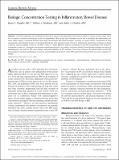Biologic Concentration Testing in Inflammatory Bowel Disease

View/
Published Version
https://doi.org/10.1097/MIB.0000000000000312Metadata
Show full item recordCitation
Vaughn, Byron P., William J. Sandborn, and Adam S. Cheifetz. 2015. “Biologic Concentration Testing in Inflammatory Bowel Disease.” Inflammatory Bowel Diseases 21 (6): 1435-1442. doi:10.1097/MIB.0000000000000312. http://dx.doi.org/10.1097/MIB.0000000000000312.Abstract
Abstract: Anti-TNF medications have revolutionized the care of patients with inflammatory bowel disease. However, despite an initial robust effect, loss of response is common and long-term results are disappointing. Much of this lack of durability may be due to inadequate dose optimization, and recent studies suggest a correlation between serum drug concentrations and clinical outcomes. Currently, in clinical practice, measurement of drug concentrations and antibodies to drug are typically performed only when a patient presents with active inflammatory bowel disease symptoms or during a potential immune-mediated reaction to anti-TNF (“reactive” setting). However, proactive monitoring of anti-TNF concentrations with titration to a therapeutic window (i.e., therapeutic concentration monitoring) represents a new strategy with many potential clinical benefits including prevention of immunogenicity, less need for IFX rescue therapy, and greater durability of IFX treatment. This review will cover the salient features of anti-TNF pharmacokinetics and pharmacodynamics and provide a rational approach for the use of anti-TNF concentration testing in both the reactive and proactive settings.Other Sources
http://www.ncbi.nlm.nih.gov/pmc/articles/PMC4437804/pdf/Terms of Use
This article is made available under the terms and conditions applicable to Other Posted Material, as set forth at http://nrs.harvard.edu/urn-3:HUL.InstRepos:dash.current.terms-of-use#LAACitable link to this page
http://nrs.harvard.edu/urn-3:HUL.InstRepos:17295717
Collections
- HMS Scholarly Articles [17920]
Contact administrator regarding this item (to report mistakes or request changes)


